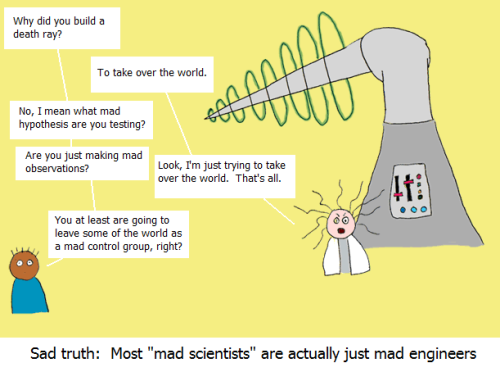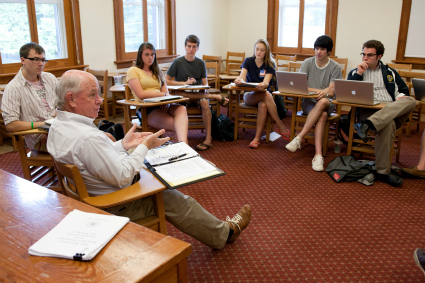We love working with students on their projects but we are especially excited when the final products come out so well. Professor Antje Pfannkuchen had her German Media Studies students create podcasts related to some element in German culture. Some are recorded in German and some are in English. A personal favorite of ours tells a fascinating little story about a lesser known fairytale by the Grimms Brothers. Well paced and engaging, we give this podcast two thumbs up!
Tag: podcasts
We have hit the middle of the semester and our class blogs are in full swing. Often our campus doesn’t even know what great stuff is being written until it is already over…..or maybe not at all. So here is a quick little overview of some great blogs you should be keeping up with.
Political Science
 The Carlisle Policy Forum is a blog for the ‘National Security Policy in the 21st Century Global Media Environment’ course taught by P.J. Crowley, the General Omar N. Bradley Chair in Strategic Leadership and former U.S. assistant secretary of state. Recently showcased on the Dickinson News page “the course examines U.S. security policy and the ways in which new and traditional media factor into world events and American foreign policy. Students use online-media tools such as blogs to comment on domestic or global happenings that have an impact on American foreign policy and discuss the potential outcomes.”
The Carlisle Policy Forum is a blog for the ‘National Security Policy in the 21st Century Global Media Environment’ course taught by P.J. Crowley, the General Omar N. Bradley Chair in Strategic Leadership and former U.S. assistant secretary of state. Recently showcased on the Dickinson News page “the course examines U.S. security policy and the ways in which new and traditional media factor into world events and American foreign policy. Students use online-media tools such as blogs to comment on domestic or global happenings that have an impact on American foreign policy and discuss the potential outcomes.”
It is getting some national attention as well as Bill Nellingan ’14 had his opinion piece “A Secret Memo, A Secret Panel, A Novel Process,” picked up by the ‘The Week’ as a “best opinion“. Kudos Bill! Senator Dodd even left a comment on the post so you know big players are reading what we that class has to say.
“Wow, Will! Your analysis is spot on. Great job!
P.S. I miss you. Come back to Washington”
Sounds like PJ has some friends in high places….who miss him.
Don’t forget to you can follow them on Twitter too!
First Year Seminars
There are a collection of First Year Seminars blogging this fall as well.
Professor Dave Richeson’s Science or Non-Sense course descriptions reads:
“We are rational beings. Our beliefs are founded on good science, we use logical reasoning to make decisions, and we have left behind the mystical beliefs of our ancestors. If this is true, then why do we spend billions of dollars each year on alternative medicine? Why do we buy lottery tickets? Why do we carry lucky charms, knock on wood, and avoid strolling under ladders. Why do we believe in the paranormal, UFOs, astrology, and the Loch Ness Monster? Why are we more afraid to fly than to cross a busy street? In this seminar we will explore the mathematical, statistical, psychological, historical, and social reasons that these seemingly irrational beliefs still have a strong hold on us. We will learn how to nurture a healthy skepticism and to develop critical thinking skills that will enable us to face these issues with our eyes and minds wide open.
The blog showcases stories that relate to myths, logic (or lack thereof), science, theory and a wealth of other topics. The students are currently posting their podcasts where each discusses a different fallacy and why people believe them. Here is one of the many interesting/humorous entries you will find on their blog .
.
Dickinson Librarian Chris Bombaro’s ‘Tell Me Why‘ FYS examines:
“the history of recorded information from the oral traditions of ancient philosophers through the age of the Internet, and how different methods of communication affect the circulation of information. We will discuss issues critical to the dissemination of information such as censorship, plagiarism, and the true cost of information. We will do this by exploring the power of questions, and how the many different kinds of questions shape the answers that we find. In this seminar we will learn to develop our intellectual curiosity by becoming proficient seekers, finders, and reporters of information. We will explore how multiple points of view relate to truthfulness and reliability of information, and we will verify information others present to us. Emphasis will be placed on how to properly and ethically engage in research, and how to skillfully and creatively report the findings of that research using traditional, paper-based methods of communication as well as the newest technological methods.”
Their blog discusses many topic related to readings and class discussions. Earlier this semester they did a series of podcasts related to mythology. Check out a few examples below.

Abroad Blogs
Want to find out what your classmates are doing while adventuring in England this semester? Check out the Norwich Science Program in London blog to find out what they are up to. From the looks of the pictures….they are having a blast.
On September 19th, Dickinson science students woke up to a rainy day in Bath. At around 9 a.m. we all left our hostel to board the coach and travel to Avebury, located about an hour away in Wiltshire, England. Many students were very excited to travel to Avebury, as they have heard that you can actually go up and touch the prehistoric rocks, unlike the world famous Stonehenge. When we arrived at Avebury, we all marveled at the extensive land that stretched over the horizon, and we were eager to learn more about this historical place. We began by taking a short walk through the Avebury museum to find out more about the mystical rocks.
Language Blogs
Professor Akiko Meguro has partnered with Nanzan University in Japan to have a course blog where the students can exchange ideas and comment on topics related to the class. They have made videos of themselves to help get to know each other as well as having Skype language exchanges throughout the semester.
Professor Duperron’s “Introductions to Cultural Analysis” students write about culture with a critical eye on the “Before Toulouse” blog. They’ll think about their own culture and begin thinking about issues they’ll likely encounter while studying abroad. Here is an example of one of their posts:
History
Professor Matt Pinsker has blogs for both History 382: US Diplomatic History and History 404: US Constitution Seminar. The History 382 course will require students “to undertake a multi-media assignment in Google Maps as well as in-depth writing assignments that include an essay on historiography and an extensive narrative paper on a critical episode in American diplomatic history prior to 2001.”
The History 404 course requires students “to produce Supreme Court case summaries, analytical word clouds, op-eds, and a major research paper that profiles a constitutional framer. ”








